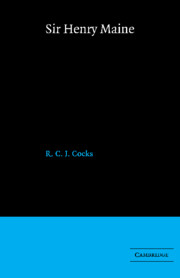Summary
MAINE'S IDEAS
In 1861 Maine published a book which he hoped would do much to improve the condition of English jurisprudence. In Ancient Law, its Connection with the Early History of Society and its Relation to Modern Ideas he wished to describe very old types of law, to explain these types by reference to their social and intellectual context, and to consider the relationship between them and modern forms of legal analysis. In the words of the brief preface to the first edition: ‘the direct object of the following pages is to indicate some of the earliest ideas of mankind as they are reflected in ancient law, and to point out the relation of these ideas to modern thought’.
Within a few years of its publication it was clear that he had written a popular book. In the view of a modern commentator discussing the development of law in the nineteenth century, Sir Henry Maine ‘wrote the only legal best seller of that, or perhaps any other century’. The popularity is easy to explain. The book is so well written that it has an appeal to readers of any generation; and to Victorians it had the added attraction of containing references to numerous topics which were fashionable at the time.
- Type
- Chapter
- Information
- Sir Henry MaineA Study in Victorian Jurisprudence, pp. 1 - 12Publisher: Cambridge University PressPrint publication year: 1988



